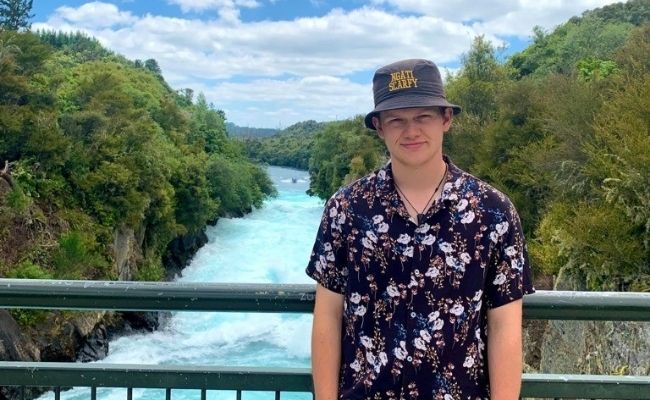
Nic Sinnott (Ko Tūwharetoa) started off his journey at Otago in 2019 and is already using his studies for research.
Ko Tongariro te maunga
Ko Taupō-nui-a-Tia te moana
Ko Tūwharetoa te iwi
Ko Te Heuheu te tangata
A career that serves others is the dream for a medical student who believes that health care can be adapted to better reach high-risk communities.
Bachelor of Medicine and Bachelor of Surgery third-year student Nic Sinnott (Ko Tūwharetoa) started off his journey at Otago in 2019 and is already using his studies for research.
“I had the awesome opportunity to do an internship in Hawkes Bay over summer working for the Māori Health team at the DHB and assisting with research. I found that a lot of people up north have difficult relationships with health care.
“It helped me to realise I want to be part of breaking down some of those barriers and helping people get the health care that they need. It was a great hands-on experience and I appreciated having the time to sit down and talk to other Māori men about visiting the doctor.”
Nic says during his research and work in Hawkes Bay the discussions with patients amplified how important it is that modern health care adapts to suit different lifestyles.
“There was a huge range of answers from that study. Going to the doctor for some of those communities needs to be normalised, many won't until they absolutely have no choice and that can be for a variety of reasons such as conflicting work schedules and being able to afford the appointment itself.
“I want to do something that will help other people. I don't want to have a selfish career that's only about myself but instead one that makes a bigger splash in the pond. The mix of medicine and people, that's where my passion is. I want to be a General Practitioner working with Māori.”
“One thing I realised is that the proper resources need to be in place so patients can be seen at a time which suits them – we do need to be proactive and work around people. Health care professionals can sometimes assume the patients will come to them but for some communities, doctors need to be actively trying to engage their patients to seek care. The assumption is made that if they don't turn up it's their fault but it's not that simple. These people have families to feed, lack of sick leave or annual leave and money can be tight.”
As a Māori man himself Nic is excited to be pursuing a career where he can have an impact on these New Zealanders.
“I want to do something that will help other people. I don't want to have a selfish career that's only about myself but instead one that makes a bigger splash in the pond. The mix of medicine and people, that's where my passion is. I want to be a General Practitioner working with Māori.”
Throughout history Nic says it has been implied that a person's culture should be kept at a distance from medical science in order to best treat that person. However, Nic will tell you that only treating an injury, as opposed to the entire person, can do more harm than good.
“I've found the forefathers who have been through medicine have suggested you need to leave your Māori cloak at the door. I've been happy to see that the Medical School have tried to change this way of thinking.
“I think the Medical School does a really good job on teaching us about compassion fatigue, burnout and with having us for six years they really do adapt to the ever-changing world around us with their teaching. Hauora Māori is a big part of our learning, we're even required to know 100 basic Māori words for our exams.”
"I was recently asked by someone if I saw myself as Pākeha or Māori and I can't think of myself that way. I think it's important to have these conversations rather than making assumptions based on skin-colour. I say whakapapa is whakapapa.”
Alongside his studies, Nic has also been part of running Te Reo classes at the Hunter Centre for staff and students and has been thrilled with the popular demand for learning.
“These classes have been possible thanks to Otago University Medical Students Association (OUMSA) and Te Oranga ki Ōtākou (TOKO) as well as some dedicated students who want to teach. I've been teaching some of these classes with my flatmate. The two of us put together this eight-week course of weekly classes for basic Māori language and conversation. We have had more than 100 students turn up. The rate of participation is amazing, people have stuck it out through the whole course.”
A hurdle the 21-year-old has found is that because his skin-tone doesn't appear to match people's expectations of a Māori man, he has had to have some tough conversations.
“I think it's important for any professional to drop any perceptions of what ethnicity you feel people are or are not, based on what they look like. People from all walks of life often look at me and it's not until I talk to them that they realise that I don't fit into a box. I was recently asked by someone if I saw myself as Pākeha or Māori and I can't think of myself that way. I think it's important to have these conversations rather than making assumptions based on skin-colour. I say whakapapa is whakapapa.”
While this at times has been a challenge, Nic acknowledges that he has an opportunity here to make a difference in his chosen field for the wider community. Alongside both his study and his teaching, he is also studying Te Pīnakitanga ki te Reo Kairangi Level 7 Diploma in Māori language and plans to take this with him into his professional practice in the future.
Kōrero by Internal Communications Adviser, Chelsea McRae
